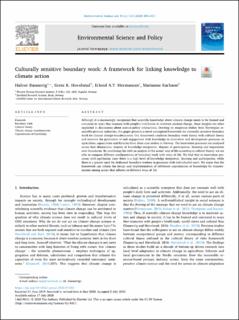| dc.contributor.author | Dannevig, Halvor | |
| dc.contributor.author | Hovelsrud, Grete Kaare | |
| dc.contributor.author | Hermansen, Erlend Andre T. | |
| dc.contributor.author | Karlsson, Marianne | |
| dc.date.accessioned | 2021-07-14T12:13:42Z | |
| dc.date.available | 2021-07-14T12:13:42Z | |
| dc.date.created | 2020-07-22T10:37:45Z | |
| dc.date.issued | 2020 | |
| dc.identifier.citation | Environmental Science and Policy. 2020, 112 405-413. | en_US |
| dc.identifier.issn | 1462-9011 | |
| dc.identifier.uri | https://hdl.handle.net/11250/2764422 | |
| dc.description.abstract | Although it is increasingly recognized that scientific knowledge about climate change needs to be framed and conveyed in ways that resonate with people’s livelihoods to motivate societal change, these insights are often neglected in discussions about science-policy interactions. Drawing on empirical studies from Norwegian renewable primary industries, this paper presents a novel conceptual framework for culturally sensitive boundary work for climate change transformation. Our framework combines boundary work theory with cultural theory and examine the production of and engagement with knowledge in innovation and development processes in agriculture, aquaculture and fisheries from three case studies in Norway. The innovation processes are analyzed across four dimensions: degrees of knowledge integration, degrees of participation, learning and negotiation over boundaries. By combining this with an analysis of the actors’ way of life according to cultural theory, we are able to compare different configurations of boundary work with ways of life. We find that in innovation processes with egalitarian users there is a high level of knowledge integration, learning and participation, while there is a greater need for dedicated boundary workers in processes with individualist users. We argue that the framework can inform the design and implementation of deliberate coproduction of knowledge for transformation among actors that adheres to different ways of life. | en_US |
| dc.language.iso | eng | en_US |
| dc.publisher | Elsevier | en_US |
| dc.rights | Navngivelse 4.0 Internasjonal | * |
| dc.rights.uri | http://creativecommons.org/licenses/by/4.0/deed.no | * |
| dc.subject | Boundary work | en_US |
| dc.subject | Cultural theory | en_US |
| dc.subject | Climate change transformation | en_US |
| dc.subject | Coproduction of knowledge | en_US |
| dc.title | Culturally sensitive boundary work: A framework for linking knowledge to climate action | en_US |
| dc.type | Journal article | en_US |
| dc.type | Peer reviewed | en_US |
| dc.description.version | publishedVersion | en_US |
| dc.source.pagenumber | 405-413 | en_US |
| dc.source.volume | 112 | en_US |
| dc.source.journal | Environmental Science and Policy | en_US |
| dc.identifier.doi | 10.1016/j.envsci.2020.07.002 | |
| dc.identifier.cristin | 1820156 | |
| dc.relation.project | Norges forskningsråd: 235435 | en_US |
| cristin.ispublished | true | |
| cristin.fulltext | original | |
| cristin.qualitycode | 1 | |

